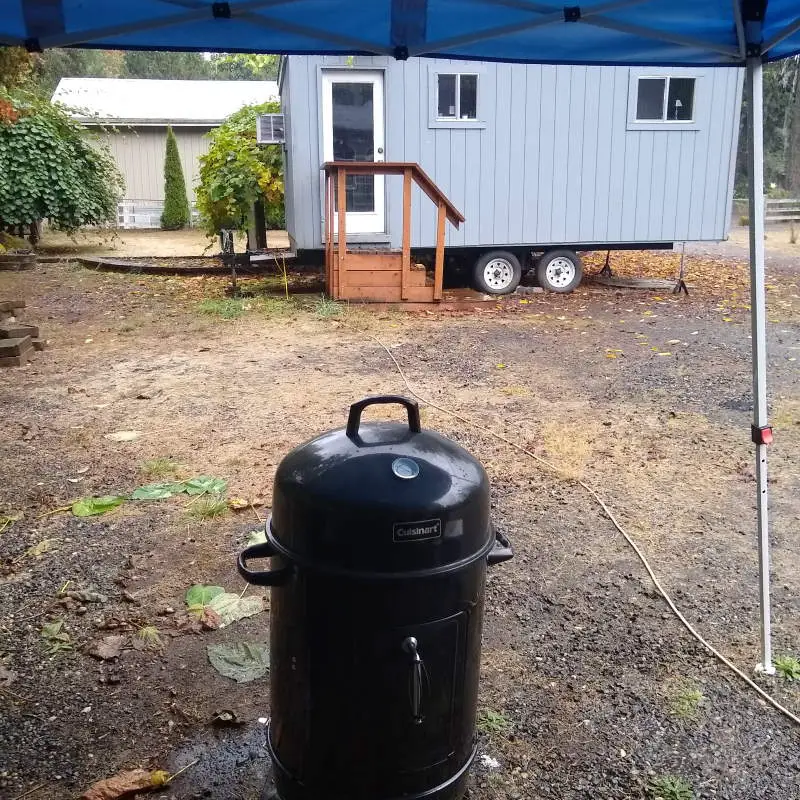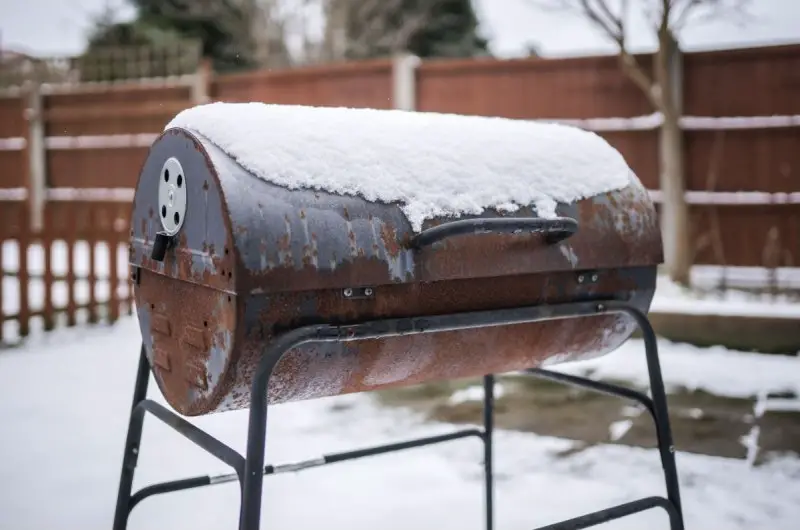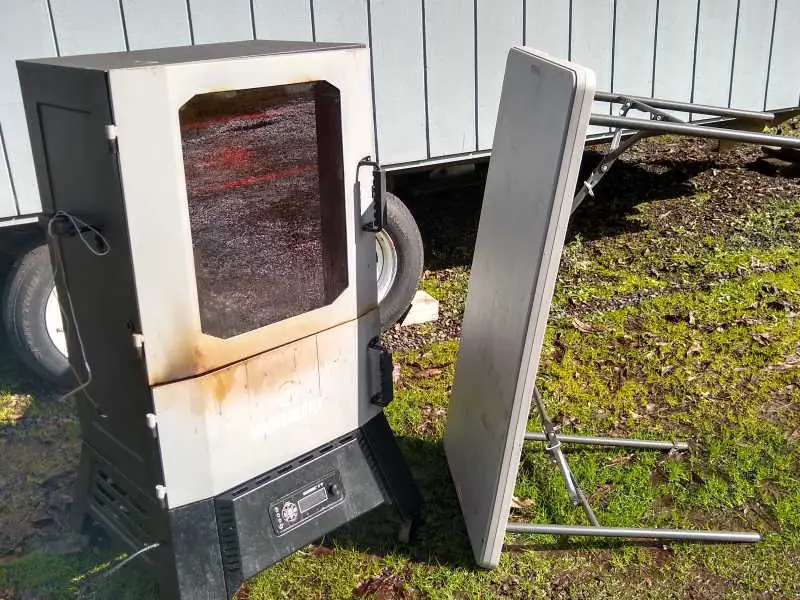
Wouldn’t it be great if every time you got ready to smoke some ribs, you would have perfect weather? Unfortunately, sometimes the weather doesn’t want to cooperate. When the forecast calls for wind, rain, or snow, what should you do? If you’re in this situation, it’s reasonable to ask if you can use a smoker in the rain or call it a day.
You can use a smoker in the rain if you prepare for it. You must keep water out of an electric smoker’s control box, you must observe a gas smoker’s flame, and a charcoal smoker will require more attention. To be prepared for weather emergencies, build a shelter for your smoker.
Nothing is simple in this world, and that applies to grilling and smoking. Whether you can get the meal on the table in time in bad weather depends on the weather and what type of smoker you use. In this guide, we’ll cover unique concerns for each type and suggest adjustments to your technique.
Note: most links in this article are Amazon.com Affiliate links, see Affiliate Disclosure, thank you.
Can You Use a Smoker in the Rain?
In most cases, you can use a smoker in the rain. However, you will have to make adjustments to the process, and those adjustments will differ slightly depending on your smoker type.
Can You Use an Electric Smoker in the Rain?
As you can imagine, the concern with an electric smoker is damage to the electric controls. If moisture gets into the controls while it’s in use, there’s a chance it can short-circuit. Then you will have to replace the controls. And who wants to do that?
When using an electric smoker in the rain, your top priority needs to be to keep water from getting into the electric controls. Unfortunately, you shouldn’t use the easiest solution, which would be to use the electric smoker in the garage. Even though an electric smoker produces less carbon dioxide than other smokers, it still produces some.
Some argue that the carbon dioxide doesn’t enter the living quarters. Just have adequate circulation and use a fan to blow the air out. However, this adds wind, and in a little bit, you will learn why wind is a more significant challenge than rain. Also, the odors from the electric smoker will take over your garage.
Instead, bring the garage to the smoker. Find some way to provide shelter for the smoker. People have come up with creative solutions—search Pinterest for wood smoker shelters for ideas or check out.
- If you are a DIYer, consider building a shed.
- If that’s not your thing, you can buy a pop-up canopy. Find one that is adjustable to keep the wind from blowing rain on your smoker.
- An outdoor storage shed is a compromise between the two. The assembly is easier than IKEA furniture, and you get a secure structure that will keep wind and rain out. Be sure to ventilate for your safety.
- If you don’t have a weatherproof enclosure for the outside outlets, get one and install it (hopefully before it rains). The Enerlites Weatherproof Cover is compatible with any standard outlets. Or you could pick one up at your local hardware store.
- Also, keep the cord off the ground to prevent water from wicking up into the box or shocking yourself.
People sometimes ask if they can use an electric smoker if it is wet. A smoker can only get wet if it doesn’t have a cover. You should probably wait a bit to let it dry off and either find the cover or order one for your model.
Warning: We recommend using caution in heavy rain and not starting if thunderstorms are forecast.
Can You Use a Propane or Natural Gas Smokers in the Rain?
With electric smokers, rain becomes a safety issue, but that is not true with propane or a natural gas smoker. Instead, the rain can cause problems with the performance of your smoker.
Temperature regulation is one advantage of an electric smoker. Press a few buttons to set the temperature and time, turn on, and the smoker does the rest. If you have a gas smoker, you sometimes wish it were that simple, right?
Once you’ve used a gas smoker a few times, you’ve learned that controlling the temperature is both a science and art. There’s the science of how the air inlets, exhaust vent, and propane work together. But there’s the art of having a successful smoke based on where you live, the smoker’s brand, and what time of year you are smoking.
If you are new to using a gas smoker and still trying to master the process, you should probably postpone cooking. That’s because the wind and rain will drop the smoker’s temperatures, and you will be doing a lot of adjusting fuel usage—in the rain.
Another concern with using a gas smoker in lousy weather is wind gusts blowing out the flame. This can ruin your smoke, especially if you find out an hour or two later.
The way to prevent this from happening is to build a windshield or break. Nothing fancy, it can be as simple as attaching two sheets of plywood in an “L” shape. If you get a third piece of plywood, you can place it on top for a makeshift roof.
Can You Use a Charcoal or Wood Smokers in the Rain?
These smokers are already more challenging than their gas and electric cousins. An electric burner or gas fuel is far more predictable than wood or charcoal. The charcoal quality or the amount of moisture in the wood are two factors that affect the burn, so a pitmaster for these smokers must be more attentive to the process.
But then there’s the superior flavor that makes the extra work worth it.
Rain can impact these smokers by lowering their temperature, meaning more time spent outside messing with the smoker. Humidity levels can also affect the smoke. So you’ll be using up more fuel than usual.
What To Do if the Fuel Gets Wet?
If your smoker fuel gets wet if, at all possible, you should avoid using it until it drys out and you can evaluate its condition. If that is not an option, here are some tips on what to do next.
If the wood was seasoned, rain should not affect your burn much. The moisture will steam off at 212°F (100°C), and then you’ll have a good smoke going. Even wood chips should not be significantly affected. After all, some people soak them first (but we won’t debate the wisdom of that here).
Wet charcoal might still be okay if it’s slightly damp. Soaked charcoal will need to be dried, however. If you use briquets, they will be harder to light because they soak up more moisture. And if you bought cheap charcoal, it might be crumbly, and it’s useless at that point.
Finally, if your charcoal is dry and you add wet wood, then the water will cool the coal, lowering the smoker’s temperature.
Should You Use Your Smoker in the Rain?
- Light rain coming through shouldn’t cause you much of a problem.
- If it is raining all day, be prepared for additional monitoring and more fuel usage.
- New smokers users might want to wait for a dry day.
- Avoid using your smoker if the weather calls for thunderstorms and heavy rain.
Tips for Grilling in the Rain
Unless you are expecting a thunderstorm or heavy rains, you can smoke in the rain. Along with the following safety suggestions, consider the following tips:
- Start a fire in the smoker earlier and plan on additional wood, charcoal, or gas.
- Have a plan for a shelter to protect your smoker from rain, and more importantly, wind.
- Don’t open the lid unless you have to
- A wired or wireless probe thermometer allows you to monitor temperatures inside.
- Use the reverse-searing method to pre-cook the meat.
Click here to read our article On Searing Meat (Steak)

Can You Use a Smoker in the Snow?
You can use a smoker in the snow. However, you will be using additional fuel. Also, you will want to find a way to insulate your smoker.
The biggest hindrance to controlling temperatures in a smoker is the metal. Cold metal will absorb heat from a fire, lowering the interior temperature. The cold air that gets sucked in can also reduce the temperature. Also, the moisture from the water pan and meat condenses on the metal inside the smoker, lowering its temperature.
The thickness of the metal also affects how much heat the smoker will hold. Insulated smokers like ceramic kamados will still require additional fuel to get the right temperatures, but they will maintain their temperature better.
Bottom line—you’re going to need additional fuel and lots of it.
Tips for Successful Winter Smokes
First, don’t believe the myth that gas smokers won’t work at low temperatures. Propane has such a low boiling point of (-44°F or -42.22°C) that you shouldn’t have problems with a gas smoker. Since you will be using additional fuel, consider getting a larger tank.
- Keeping the lid closed is even more critical in the cold.
- Use bricks in the cooking chamber if there’s room. They will radiate absorbed heat.
- Insulate your smoker with a cold-weather jacket. Jackets designed for your smoker should have flaps for adjusting vents, reading temperature indicators, and other features of your smoker, as well as fireproof.
- Make your own weather jacket. Welding blankets are excellent insulators that won’t catch on fire. Water heater insulation, foil insulation, and aluminum foil can also be used as insulators. If you are concerned about the insulation melting and catching on fire, build a small enclosure with plywood wrapped in aluminum insulation.
If you can keep it dry, an electric smoker would be the easiest choice since the temperature inside will be constant. Of course, you will need additional time for it to warm up.

Can You Use a Smoker in the Wind?
The wind is the real enemy of a smoker. The vents bring in oxygen, but the wind will force you to continually adjust the vents with no guarantee the smoker will stay warm enough. The wind is also unpredictable as its speed and direction can change. We’ve already talked about gas smokers and wind gusts.
You might be able to locate the smoker where the prevailing winds won’t interfere with air intake as much. But the best solution is to have a shelter or break to block the wind. If sheltering your smoker is impossible, you can construct a simple windbreak to slow the wind gusts.
Unless you are an experienced pitmaster, you will find smoking in the wind frustrating if the smoker is not sheltered.
Once again, electric smokers are an exception because the heating elements control the temperature, making them the best option for windy areas.
Conclusion
You shouldn’t let a little rain stop you from smoking your ribs, chicken, or other meat. Realize that you should adjust your cooking technique depending on the kind of smoker you will be using. You will also need to adjust your cooking techniques for rain or snow.
Wind will present the most significant challenges, so why not go ahead and prepare for rain, wind, and snow by building a shelter for your smoker.

